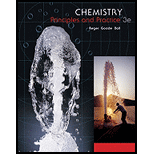
Concept explainers
(a)
Interpretation:
Sodium chloride obtained from a mine present in United States has the same ratio of sodium chloride obtained from a mine in France has to be explained based on Dalton’s atomic theory.
(a)
Explanation of Solution
Dalton’s Atomic theory tells that the relative number of atoms present in a particular compound is always the same. Considering this it can be said that sodium chloride obtained anywhere around the world will have the same ratio of components in it. This is because sodium chloride is a pure substance.
(b)
Interpretation:
Sum of the mass of hydrogen and oxygen gas is equal to the mass of hydrogen peroxide has to be explained based on Dalton’s atomic theory.
(b)
Explanation of Solution
Dalton’s Atomic theory tells that the mass of an atom does not change in a
Want to see more full solutions like this?
Chapter 2 Solutions
Chemistry: Principles and Practice
- There are 2.619 1022 atoms in 1.000 g of sodium. Assume that sodium atoms are spheres of radius 1.86 and that they are lined up side by side. How many miles in length is the line of sodium atoms?arrow_forwardThe photo here depicts what happens when a coil of magnesium ribbon and a few calcium chips are placed in water. (a) Based on these observations, what might you expect to see when barium, another Croup 2A element, is placed in water? (b) Give the period in which each element (Mg. Ca, and Ba) is found. What correlation do you think you might find between the reactivity of these elements and their positions in the periodic table?arrow_forwardGive the complete symbol (XZA), including atomic number and mass number, of (a) a nickel atom with 31 neutrons, and (b) a tungsten atom with 110 neutrons.arrow_forward
- The formula of water is If-O. Which of the following is indicated by this formula? Explain your answer. a. The mass of hydrogen is twice that of oxygen in each molecule. b. There are two hydrogen atoms and one oxygen atom per water molecule. c. The mass of oxygen is twice that of hydrogen in each molecule. d. There are two oxygen atoms and one hydrogen atom per water molecule.arrow_forwardArrange the following in the order of increasing mass. (a) a potassium ion, K+ (b) a phosphorus molecule, P4 (c) a potassium atom (d) a platinum atomarrow_forwardTwo compounds of iron and chlorine, A and B, contain 1.270 g and 1.904 g of chlorine, respectively, for each gram of iron. Show that these amounts are in the ratio 2 : 3. Is this consistent with the law of multiple proportions? Explain.arrow_forward
- Each of the following statements is true, but Dalton might have had trouble explaining some of them with his atomic theory. Give explanations for the following statements. a. The space-filling models for ethyl alcohol and dimethyl ether are shown below. These two compounds have die same composition by mass (52% carbon, 13% hydrogen, and 35% oxygen), yet the two have different melting points, boiling points, and solubilities in water. b. Burning wood leaves an ash that is only a small fraction of the mass of the original wood. c. Atoms can be broken down into smaller particles. d. One sample of lithium hydride is 87.4% lithium by mass, while another sample of lithium hydride Ls 74.9% lithium by mass. However, the two samples have the same chemical properties.arrow_forward2.90 Naturally occurring europium has an average atomic weight of 151.964 amu. If the only isotopes of europium present are 151Eu and 153Eu, describe how you would determine the relative abundance of the two isotopes. Include in your description any information that would need to be looked up.arrow_forwardCalculate the atomic mass of each of the following elements using the given data for the percentage abundance and mass of each isotope. a. Silver: 51.82% 107Ag (106.9 amu) and 48.18% 109Ag (108.9 amu) b. Silicon: 92.21% 28Si (27.98 amu), 4.70% 29Si (28.98 amu), and 3.09% 30Si (29.97 amu)arrow_forward
 General, Organic, and Biological ChemistryChemistryISBN:9781285853918Author:H. Stephen StokerPublisher:Cengage Learning
General, Organic, and Biological ChemistryChemistryISBN:9781285853918Author:H. Stephen StokerPublisher:Cengage Learning ChemistryChemistryISBN:9781305957404Author:Steven S. Zumdahl, Susan A. Zumdahl, Donald J. DeCostePublisher:Cengage Learning
ChemistryChemistryISBN:9781305957404Author:Steven S. Zumdahl, Susan A. Zumdahl, Donald J. DeCostePublisher:Cengage Learning
 Chemistry: Principles and ReactionsChemistryISBN:9781305079373Author:William L. Masterton, Cecile N. HurleyPublisher:Cengage Learning
Chemistry: Principles and ReactionsChemistryISBN:9781305079373Author:William L. Masterton, Cecile N. HurleyPublisher:Cengage Learning Chemistry: The Molecular ScienceChemistryISBN:9781285199047Author:John W. Moore, Conrad L. StanitskiPublisher:Cengage LearningChemistry: Matter and ChangeChemistryISBN:9780078746376Author:Dinah Zike, Laurel Dingrando, Nicholas Hainen, Cheryl WistromPublisher:Glencoe/McGraw-Hill School Pub Co
Chemistry: The Molecular ScienceChemistryISBN:9781285199047Author:John W. Moore, Conrad L. StanitskiPublisher:Cengage LearningChemistry: Matter and ChangeChemistryISBN:9780078746376Author:Dinah Zike, Laurel Dingrando, Nicholas Hainen, Cheryl WistromPublisher:Glencoe/McGraw-Hill School Pub Co





